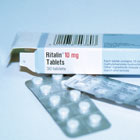GPs urged to be cautious about prescribing ritalin by gold-standard review

GPs should be cautious about prescribing the drug ritalin for ADHD, according to the authors of a new Cochrane review.
The researchers said it was still not clear whether ritalin – or methylphenidate – helps to reduce symptoms of the disorder, despite a lot of research into its effects, while some evidence showed it was linked with sleeplessness and loss of appetite.
The meta-analysis included data from 185 randomised controlled trials involving more than 12,000 children or adolescents with symptoms of ADHD (Attention Deficit Hyperactivity Disorder).
It showed methylphenidate led to modest improvements in ADHD symptoms and general behaviour reported by teachers, and quality of life as reported by parents, while children were more likely to experience sleep problems and loss of appetite when taking the drug.
However, the researchers said the quality of the trials was ‘very low’, with a ‘serious’ risk of bias, a lack of full reporting of outcomes and large variation in the results between different trials.
As a result, the review concluded that the benefits of methylphenidate were uncertain – while its harms could be more common than has been reported.
Co-author Camilla Groth, from Herlev University Hospital in Denmark, said: ‘This review shows very limited quality evidence for the effects of methylphenidate on children and adolescents with ADHD. Some might benefit, but we still don’t know which patients will do so.
‘Clinicians prescribing methylphenidate must take account of the poor quality of the evidence, monitor treatment carefully, and weigh up the benefits and adverse effects.’
Cochrane Database of Systematic Reviews 2015; available online 25 November
Visit Pulse Reference for details on 140 symptoms, including easily searchable symptoms and categories, offering you a free platform to check symptoms and receive potential diagnoses during consultations.









